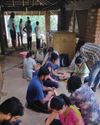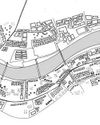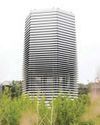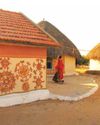試す 金 - 無料
Drawing On The Past To Redefine The Future
Indian Architect & Builder
|August 2017
In today’s increasingly competitive world, schools are constantly under pressure to provide the best for their students – be it in curriculum or in their physical environment and facilities. This becomes even more pronounced when the students happen to come from around the world, making the school a melting pot of cultures. What, then, is a culturally appropriate design for a school that is inclusive, state-of-the-art, and yet embraces sustainability? As a response to these musings, and catering to the diverse expatriate community in New Delhi’s diplomatic enclave, The British School by Morphogenesis draws inspiration from Indian traditional architectural techniques to offer a truly world-class learning environment that is yet rooted in its context.

There is no dearth of research and reports that indicate the importance of holistic education. Plus, there is unprecedented competition today, not only for our children but also their schools. Naturally, schools are stepping up their game like never before. This includes both, the way they design their curriculum, and the physical infrastructure they provide. And so it comes as no surprise that there is now an increasing demand for an architecturally appropriate school building, complete with well-thought-out, well-designed spaces that aid students’ all-round development.
And yet, there is a paradox here. Often, the response to this demand is a building that scores high on aesthetics, guzzles up energy to offer an air-conditioned, sanitized environment that is typically associated with an ‘international’ feel. But is this the best type of school for our children? Moreover, is it the best possible option in terms of terms of sustainability, architecture and design?
Morphogenesis’ design for The British School in New Delhi presents a design thinking that attempts to defy the norm. The school has students from over 55 nationalities, making it a truly diverse assortment of curious minds eager to be shaped. Thus, the design had to be socio-culturally inclusive, creating an atmosphere that fosters social cohesion. The design thus resonates with the School’s motto – An international education with an Indian soul. With this motto as the guideline that informed and shaped the design, the architecture makes a compelling case for a renaissance in the school-building typology.
このストーリーは、Indian Architect & Builder の August 2017 版からのものです。
Magzter GOLD を購読すると、厳選された何千ものプレミアム記事や、10,000 以上の雑誌や新聞にアクセスできます。
すでに購読者ですか? サインイン
Indian Architect & Builder からのその他のストーリー

Indian Architect & Builder
Interlacing Perspectives
‘Meraki-2019’ A visionary Seminar series presented by Dr.Baliram Hiray College of Architecture, Bandra(East), Mumbai.
3 mins
November 2019

Indian Architect & Builder
Facilitating A Community Through Architectural Practice
The humble, self-designed, self-built and organically planned home built by the majority of the world population rarely gets appreciated and critiqued as a viable lesson in architectural design.
5 mins
November 2019

Indian Architect & Builder
The Art Of Solving Problems Creatively
The practice of architecture is perhaps incomplete without the complement of a variety of other arts.
3 mins
November 2019

Indian Architect & Builder
Upcycling towards a playful tomorrow
Play is like the middle child, often forgotten, and always taking a back seat. For young kids, play can simply be running around, armwrestling with friends, building sandcastles on the beach, or singing popular music tracks in the shower.
3 mins
November 2019

Indian Architect & Builder
Balancing The Poetics And Pragmatism Of Everyday Design
Humanity is faced with an oxymoronic crisis. The crisis involves the earth, the environment, impending looms of climate change, deforestation, loss of species, dwindling resources etc.
3 mins
November 2019

Indian Architect & Builder
Just Give Me Some Space: Discussions And Beyond
Just Give Me Some Space (JGMSS) is Suha Riyaz Khopatkar’s debut book that paints a portrait of the dynamic life of an architecture student.
17 mins
November 2019

Indian Architect & Builder
The Next In Vernacular Architecture
Architecture has become a capitalist.
5 mins
IAB October 2019

Indian Architect & Builder
Rethinking The Future: Architecture And Its Education
“I want to be like animals, the bird makes a nest in one or two days, the rat digs a hole in a night, but intelligent humans like us spend 30 years to have a house, that’s wrong.” - Jon Jandai
10 mins
IAB October 2019

Indian Architect & Builder
Uniting The Human-Scale With The City-Scale
London-based architect Usman Haque is famed for his interactive architectural systems, and for his exploration of newer, more effective ways of creating human engagement and interaction through his designs. Indian Architect & Builder caught up with him, to quiz him on a variety of topics such as his journey as an architect, his inspirations and philosophies, architects using the digital revolution to their advantage, and more!
6 mins
IAB October 2019

Indian Architect & Builder
Framing spaces
Almost every architect also doubles as a photographer or at least an enthusiast.
5 mins
IAB October 2019
Translate
Change font size
